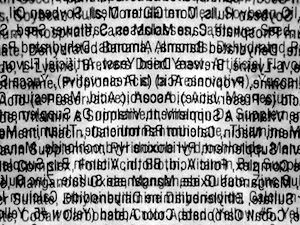Capitalism Is Changing Our Language
Researchers at UCLA put 1.5 million English-language books into a tool that catalogs phrase usage and found that "over the last 200 years there has been an ever-increasing use of particularly acquisitive words: 'get', 'unique', 'individual', 'self', 'choose'; while over the same period 'give' and 'obliged' decreased," Owen Hatherley writes at The Guardian.
Researchers at UCLA put 1.5 million English-language books into a tool that catalogs phrase usage and found that “over the last 200 years there has been an ever-increasing use of particularly acquisitive words: ‘get’, ‘unique’, ‘individual’, ‘self’, ‘choose’; while over the same period ‘give’ and ‘obliged’ decreased,” Owen Hatherley writes at The Guardian.
The pattern only changed briefly during the relatively egalitarian Western period between the 1940s and the 1970s.
“What has happened over those 200 years was the rise to dominance of capitalism, which obviously changed, and changes, our language and thinking,” Hatherley continues. The results suggest that the English language has long been in the process of becoming a class language, where words that are sympathetic with capitalist values and perspective are accepted as “standard.”
The project has a precedent. Mid 20th-century Welsh socialist writer Raymond Williams tried to uncover this class drift of the English language. In his 1958 work “Culture and Society,” Williams suggested that keywords like “democracy,” “art,” and “industry” were old terms that had acquired almost entirely new meanings. For instance, over the same 200 years studied by the L.A. researchers, the word “artist” went from referring to “a skilled person” to signifying “a special kind of person” working in the “imaginative” or “creative” arts.
In 1961’s “The Long Revolution,” Williams examined how French and Anglo-Saxon words were similarly or differently weighted with class associations. He wrote: We can trace the minor relics of class prejudice in the lasting equation of moral qualities with class names: base, villain, boor and churl for the poor,” terms that mostly suggested “low” birth, while “gentle,” “proud,” and “rich” were aristocratic terms originating in French. In 1962’s “Communications,” Williams looked at the use of martial metaphors “bomb,” “hit,” “battle” and “bout,” that immediately and covertly attempt to shape the reader’s opinion on a given subject.
“The Long Revolution” closely scrutinized the word “consumer,” a word we use unthinkingly to describe the “consumption” of goods and services. “It is clear why ‘consumer’ as a description is so popular,” Williams wrote. “[A] considerable and increasing part of our economic activity goes to ensuring that we consume what industry finds it convenient for us to produce. As this tendency strengthens, it becomes increasingly obvious that society is not controlling its economic life, but is in part being controlled by it.”
— Posted by Alexander Reed Kelly.
Your support is crucial…Owen Hatherley at The Guardian:
Other terms, seemingly equivalent, would not actually mean the same thing – if we were “users” instead of “consumers”, [Williams] argues, “we might look at society very differently, for the concept of use involves general human judgments – we need to know how to use things and what we are using them for… whereas consumption, with its crude hand-to-mouth patterns, tends to cancel these questions, replacing them by the stimulated and controlled absorption of the products of an external and autonomous system”.
Williams expanded this into Keywords (1976), an entire “vocabulary” of political English. What would a contemporary edition of Keywords look like? I suspect it would find “consumer” used to an even more all-encompassing degree, and a menagerie of strange positive terms, appearing unquestioned in the language without their implications being obvious. Nowadays we use words like “regeneration”, “social network”, “social enterprise” frequently and often without thinking – all of them bestow particular moral qualities as soon as the word has been said.
Even a word as central to the current debate as “austerity” comes with its own bias: originally from the Old French austerite meaning “harshness or cruelty”, it carries in Britain also a positive meaning, being associated with the self-restraint at the expense of the public good which was required by the wartime economy, when nowadays it is used to justify policies that effect the exact opposite. But to reveal the pernicious assumptions behind these professedly innocuous words will take more than a sophisticated search engine.
With an uncertain future and a new administration casting doubt on press freedoms, the danger is clear: The truth is at risk.
Now is the time to give. Your tax-deductible support allows us to dig deeper, delivering fearless investigative reporting and analysis that exposes what’s really happening — without compromise.
Stand with our courageous journalists. Donate today to protect a free press, uphold democracy and unearth untold stories.






You need to be a supporter to comment.
There are currently no responses to this article.
Be the first to respond.